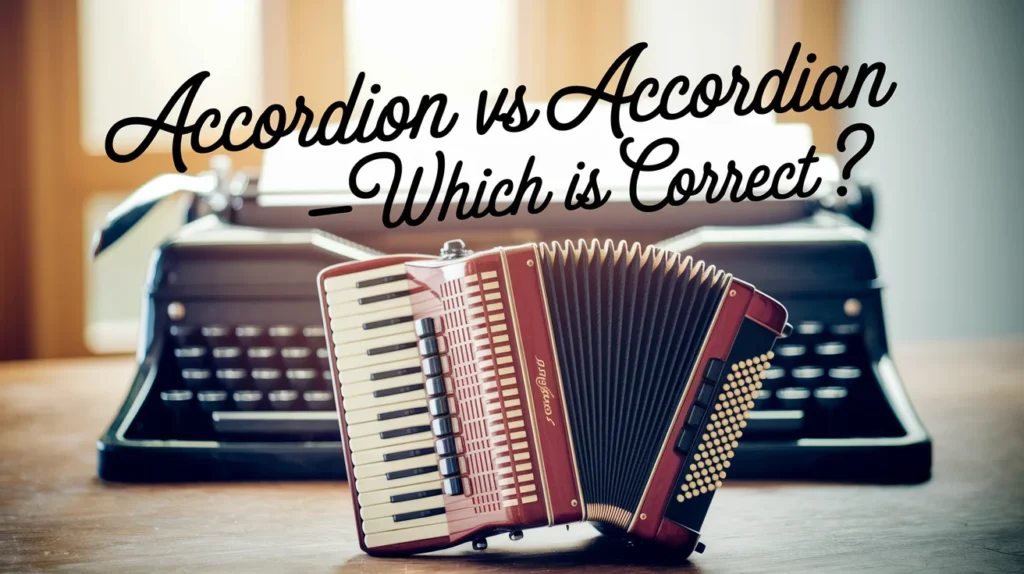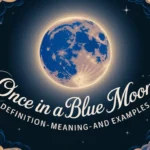Do you ever find yourself wondering whether you’re spelling accordion correctly or questioning if “accordian” might just be a valid version? If you’ve ever hesitated over this common confusion, you’re not alone.
Whether you’re writing a music review, composing a blog post, or simply chatting about instruments, getting the spelling of words right is crucial for maintaining clarity and professionalism.
In this article, we’ll explore the correct spelling, accordion, and clarify why the alternate version, “accordian,” is a common mistake.
You’ll also learn helpful tips to ensure you never get it wrong again, as well as dive into the etymology and importance of the term.
By the end, you’ll have all the tools you need to confidently use the right spelling in your own writing. Let’s get started!
What is an Accordion?
Before we dive into the spelling debate, let’s first understand what an accordion actually is. This popular musical instrument has a rich history and a distinctive sound that sets it apart from other instruments. But what exactly makes it so special?
Definition and Meaning
An accordion is a portable musical instrument, typically played by compressing and expanding bellows while pressing buttons or keys. The instrument produces sound as air flows through reeds inside, making it one of the most unique and versatile instruments in the world.
This instrument is often associated with folk music, polka, French chansons, and even classical music. Its ability to produce a variety of tones and melodies has made it beloved in many different cultures worldwide.
Origin of the Word “Accordion”
The word “accordion” has its roots in the German language, derived from the word “Akkordion.” This term itself comes from “Akkord,” which means “chord” in German, reflecting the instrument’s ability to play multiple notes at once.
While the accordion has evolved throughout the years, its core design has remained largely the same since it was first patented in the early 19th century.
Common Uses of the Accordion
You’ll often hear the accordion in genres like Cajun, Tango, and Latin American music, especially in countries like Argentina, Mexico, and France. The instrument is also used in traditional music festivals and has even found a place in contemporary pop culture.
Whether you’re attending a lively Irish pub session or watching a French street performance, the accordion plays a role in creating the atmosphere that draws people together through music.
What is “Accordian”?
Now, let’s talk about the alternate version: “accordian.” Though it seems like it could be a plausible spelling, it’s important to understand why this version is incorrect and what leads people to misspell the word.
The Common Mistake
“Accordian” is an incredibly common spelling mistake. In fact, many people mistakenly drop one of the double “o”s, thinking it’s unnecessary. In spoken language, the word accordion might sound like it has a single “o” sound, leading some to believe that “accordian” is correct.
Why It’s Not Correct
Unfortunately, “accordian” doesn’t align with the correct English spelling rules. English words often follow specific patterns, and in this case, “accordion” has a unique etymology that demands two “o”s.
Dropping one changes the word structurally and phonetically, causing it to lose its historical and linguistic integrity.
Moreover, “accordian” doesn’t show up in any reputable dictionary. Merriam-Webster, Oxford English Dictionary, or Cambridge Dictionary will only list the correct spelling, “accordion.”
How to Remember the Correct Spelling: “Accordion”
Getting the spelling right is easy once you have a few tricks up your sleeve. The key to avoiding common mistakes like “accordian” is understanding the logic behind the correct form. Let’s explore a few simple ways to remember the right spelling.
Memory Tips for “Accordion”
- Think of the Double “O” as a “Double Key”: The accordion has two rows of buttons or keys for each note, symbolizing the two “o”s in the word. You could even picture the shape of the instrument—its bellows accordion-style expanding to two sides, which may help trigger the memory.
- Break It Down Phonetically: While it may sound like there’s only one “o”, saying the word aloud—ac-cord-io-n—can help you hear the full version, with a distinct sound for each part of the word.
- Use Visualization: Picture the accordion with two sets of buttons and then visualize the word as having two “o”s. This mental image will reinforce the correct spelling.
Phonetic Clue
By focusing on how the word sounds and aligning it with the structure of the instrument, you can “hear” the extra “o” in the word. This audio-visual connection between the instrument and the word is a solid strategy for memorization.
Understanding English Spelling Patterns
English often has irregular spelling, but there are some patterns. For example, words with double letters like “good” or “tool” often retain that doubled consonant or vowel sound. The word “accordion” follows this pattern, and remembering the double “o” becomes easier with some practice.
Examples of Common Misspellings
Now, let’s explore some real-life examples of people who might mistakenly spell “accordion” as “accordian”.
Real-Life Examples
- Blogs & Articles: In numerous articles on music or instrument reviews, “accordian” appears more often than you might think. Writers may unintentionally make this error when typing quickly or relying on spell-check software, which often doesn’t catch such mistakes.
- Search Engine Results: A quick search for “accordian” often returns incorrect content. This is because search engines are crawling websites that use the wrong spelling, meaning that incorrect usage can spread quickly.
- Social Media Posts: Whether it’s on Instagram, Twitter, or Facebook, posts about the accordion might get tagged or labeled incorrectly as “accordian.” It’s important to avoid these slip-ups, especially when you want to maintain authority and credibility.
The Importance of Correct Spelling
Why does spelling matter so much? Spelling plays a key role in your professionalism and the clarity of your writing. Whether you’re blogging, writing an email, or composing a song, getting it right sends a message to your readers that you’re careful and knowledgeable.
Why Accuracy Counts
Spelling mistakes can hurt your credibility and trustworthiness. If you’re writing about music, especially when using a specialized term like “accordion,” your readers expect you to get it right. Small errors, like misspelling “accordion” as “accordian,” might cause people to question your expertise.
Professional Communication
In formal writing, spelling errors often reflect a lack of attention to detail. Accurate spelling demonstrates your commitment to the topic and your ability to communicate effectively.
Is “Accordian” Ever Correct?
So, is there ever a time when “accordian” might be used? Let’s explore this idea.
Accidental Usage in Informal Settings
There might be cases where “accordian” pops up in informal writing, like in song lyrics, casual social media posts, or creative fiction. However, in all formal or professional contexts, this spelling should be avoided.
Regional Variations?
Despite occasional mistakes, no reputable sources or regional linguistic communities accept “accordian” as a valid spelling. The word remains firmly established as “accordion”.
Conclusion
Now that we’ve explored the history, the importance of spelling, and the ways to remember the correct form, you should have a clear understanding of why “accordion” is the correct spelling and how to avoid the common mistake of using “accordian.”
Remember, it’s not just about spelling. It’s about ensuring your communication remains professional, authoritative, and trustworthy. Keep practicing, and soon enough, spelling “accordion” will feel as natural as playing the instrument itself.
FAQs:
1. Is “accordian” a common misspelling?
Yes, “accordian” is a common misspelling of “accordion.” Many people mistakenly drop one of the double “o”s, often due to how the word sounds when spoken. However, the correct spelling is “accordion.”
2. Why is the correct spelling “accordion” and not “accordian”?
The correct spelling, “accordion,” comes from the German word “Akkordion,” which is derived from “Akkord” meaning “chord.” The word follows the spelling pattern of many other words with double letters and reflects the structure and history of the instrument. “Accordian” is an incorrect version that doesn’t align with the word’s etymology.
3. How do I remember the correct spelling of “accordion”?
Here are a few tips to help:
- Visualize the instrument: The accordion has two rows of keys or buttons, just like the word has two “o”s.
- Phonetic breakdown: Saying the word aloud as ac-cord-io-n can help you hear both “o”s.
- Think of the double “o” as a “double key” for each note, which can help you visualize the correct spelling.
4. Can “accordian” ever be correct?
No, “accordian” is never a valid spelling of the word in any formal or professional context. While you may encounter it occasionally in informal settings or creative works, the proper spelling is always “accordion.”
5. Why does the misspelling of “accordion” matter?
Using the correct spelling of “accordion” is important for maintaining professionalism, credibility, and trustworthiness in your writing. Spelling errors, such as using “accordian,” can make your writing appear less polished and might cause readers to question your expertise.

Mira Olive is a passionate spiritual writer dedicated to exploring the profound meanings behind angel numbers. With a background in numerology and a deep connection to the spiritual realm, Mira crafts insightful articles that guide readers on their journeys of self-discovery and personal growth.



